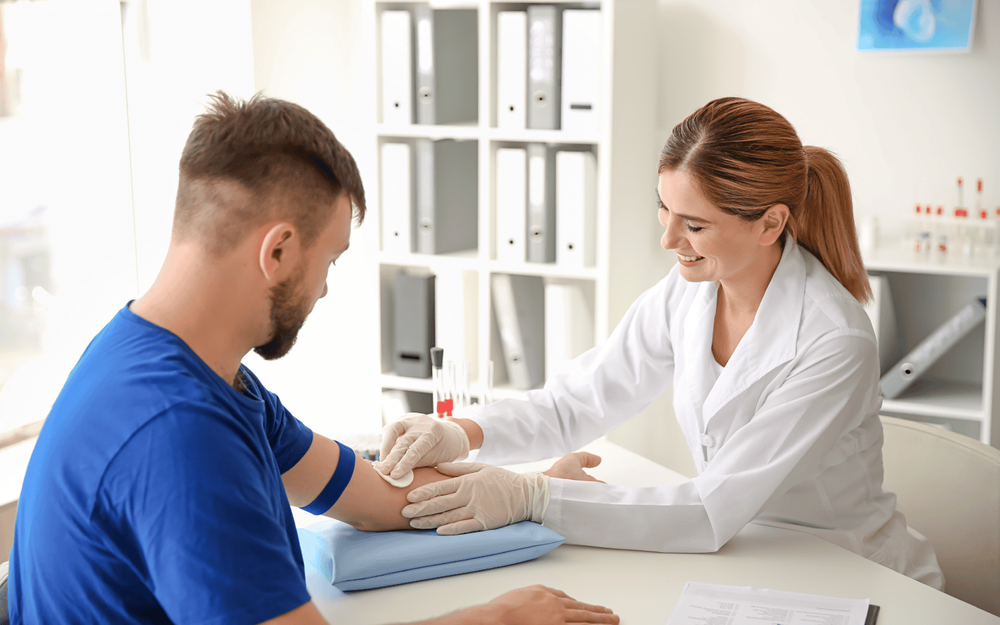
Causes and Risks of High Cholesterol
Cholesterol is a fatty substance produced in the liver and found in some foods that we eat. Our bodies need some cholesterol to function normally, but when our levels are elevated, we put ourselves at greater risk of a range of health risks of high cholesterol.
In this article, we will explain the causes and risks of high cholesterol to help you understand how to take a proactive approach to maintaining your cholesterol levels within a healthy range.
What does high cholesterol mean?
High cholesterol is when you have too much cholesterol circulating in your blood. The health risks of high cholesterol include a higher risk of heart disease, heart attacks and strokes, so it’s important to maintain your levels within a healthy range.
Cholesterol is a type of blood fat mainly made in the liver, but it is also found in some foods. Often considered ‘bad’, cholesterol is essential for our body to function normally and is vital for brain, nerves, and skin health.
Cholesterol combines with proteins to form lipoproteins, which are transported around the body in our blood. There are two main types of lipoproteins:
- Low-density lipoproteins (LDL) – contain lots of cholesterol and little protein and can build up in blood vessel walls if too much, leading to high cholesterol implications, such as heart attacks and stroke. For this reason, LDL cholesterol is often referred to as ‘bad cholesterol’.
- High-density lipoproteins (HDL) – often referred to as ‘good cholesterol’ HDL carries cholesterol away from the cells and back to the liver where it can be removed from the body. For this reason, higher levels of HDL cholesterol are generally considered good. Find out more about HDL cholesterol in our guide.
What causes high cholesterol?
There are many causes of high cholesterol levels. Some factors are within your control, and these are known as modifiable risk causes. However, some are outside of your control, called non-modifiable causes.
What are the risk factors of high blood cholesterol?
Non-modifiable risk factors of high cholesterol can include:
- Age – your risk of high cholesterol increases as you age
- Gender – males are more at risk of high cholesterol than females
- Ethnicity – people from certain ethnicities are at greater risk of high cholesterol
- Family history – if you have a family history of high cholesterol, you are at greater risk
- Certain medications – some medications you may be required to take because of other medical conditions may increase your risk of high cholesterol levels
Some modifiable factors that can cause high cholesterol include:
- Eating a diet high in saturated fat – this reduces the liver’s ability to remove cholesterol, causing it to build up in the blood
- Being physically inactive – physical activity can raise the level of good cholesterol and reduce the level of bad cholesterol circulating in your blood
- Smoking – smoking causes tar to build up in your arteries, making it easier for cholesterol to stick to your artery walls
- Being overweight – especially carrying excess weight around your middle can raise cholesterol levels
In addition to the above factors, your general health can also cause high cholesterol levels with certain health conditions increasing your risk of high cholesterol, such as:
- Kidney disease – when your kidneys are not functioning, it changes the way your body handles cholesterol which can lead to higher levels
- Liver disease – one of the liver’s jobs is to produce cholesterol and clear it from the body, so if the liver is not working correctly your cholesterol levels may increase
- Type 2 diabetes – can put you at greater risk of having high cholesterol
- Underactive thyroid
- Growth hormone deficiency
What health problems can high cholesterol cause?
One of the biggest dangers of high cholesterol levels is that most people don’t have any symptoms of the condition. This means that you may be living with high cholesterol levels and not know anything about it.
However, over time high cholesterol causes a range of medical conditions, including:
- Heart disease – high cholesterol levels can cause plaque to build up in the wall of your arteries, narrowing and restricting blood flow to your heart. This can lead to heart disease.
- Heart attacks – a build-up of fatty deposits known as plaque can tear or rupture, causing a blood clot to form at the rupture site. This can completely stop blood flow to your heart, causing you to have a heart attack.
- Strokes – occur when a blood clot blocks blood flow to your brain.
How to reduce risk of high cholesterol?
To reduce your risk of high cholesterol levels, you can make some lifestyle changes, such as:
- Eating a healthy, balanced diet - you can find out more about heart healthy foods that can help reduce your cholesterol levels in our guide to lowering cholesterol levels with food.
- Exercising regularly
- Stopping smoking
- Limiting alcohol intake
For some people, lifestyle changes alone will not be enough to reduce their cholesterol levels. However, reducing your cholesterol levels with medications is possible, the most commonly used being statins.
Check your cholesterol levels
If you are concerned about your cholesterol levels, a cholesterol blood test can offer insights into your levels. At Bluecrest Wellness, our private cholesterol blood test is designed to give you insights into your cholesterol levels, including your total cholesterol and cholesterol ratio.
A cholesterol blood test is included in all of our health MOTs. These full body health checks provide you with information about your cholesterol levels alongside comprehensive insights into your overall health, including your blood pressure and risk of certain health conditions.
We use the latest technologies to ensure accurate results and all our tests can be booked at a time and location that’s convenient for you. In addition, every full health assessment comes with a comprehensive Results Report and free access to a 24/7 GP helpline for a year for complete peace of mind following your health assessment.
BOOK A PRIVATE HEALTH MOT TODAY











